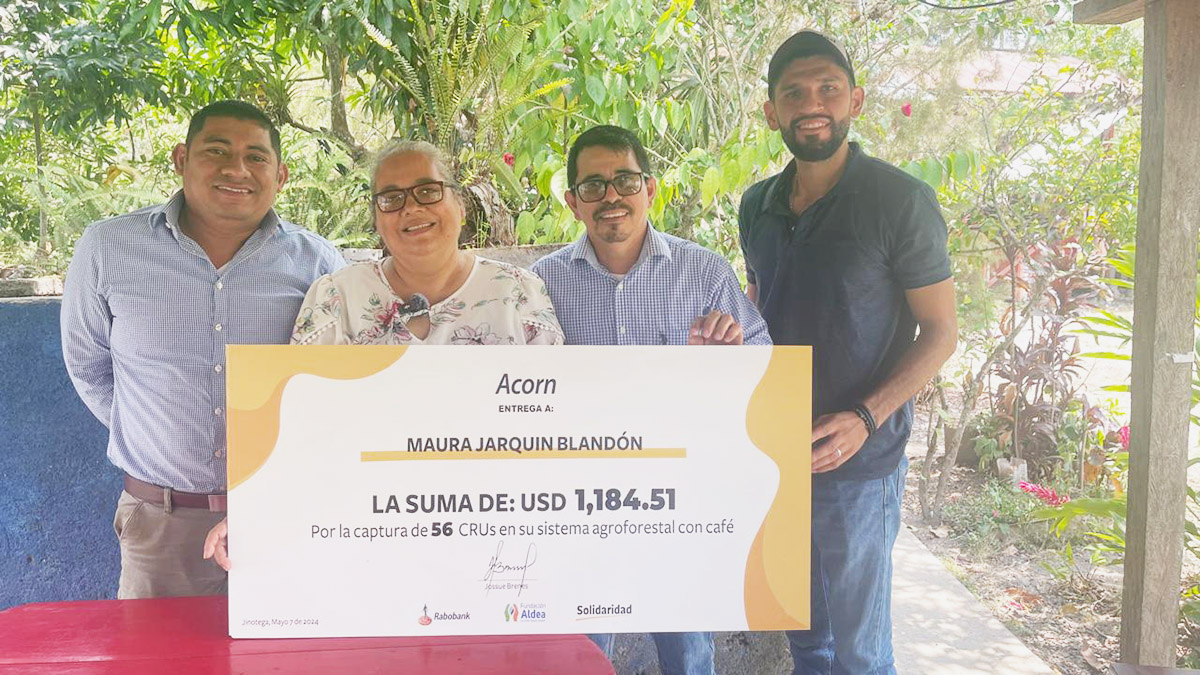In Nicaragua, Solidaridad is linking producers who have established and/or improved agroforestry systems to voluntary carbon markets.
Most current coffee and cocoa production systems are based on intensive practices that rely on chemical inputs and high production costs. These systems put families and the land in jeopardy, both economically and environmentally.
In this context, voluntary carbon markets offer an opportunity to smallholder coffee and cocoa producers engaged in sustainable practices. Climate-smart practices, like agroforestry, increase smallholder resilience to climate change, while opening the door to an additional income for their environmental efforts.
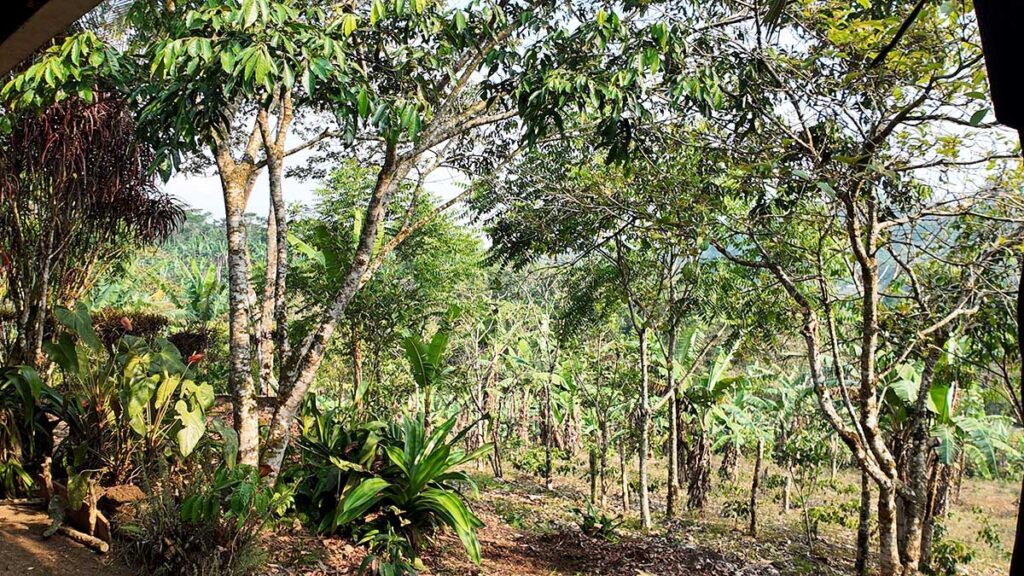
In Nicaragua, Solidaridad has partnered with Rabobank’s Acorn platform, the Netherlands Postal Code Lottery (NPL), Alliance Bioversity & CIAT, producer organizations and private companies to support coffee and cocoa producers to access voluntary carbon markets.
Joining efforts is more than a strategy nowadays, it is key to reaching sustainable results that can be adapted to the farmer families’ reality.
Jossue Brenes, Solidaridad Country Lead in Nicaragua
Celebrating a year of progress with coffee growers in Nicaragua
Asómbrate is an initiative designed by Solidaridad to help small-scale coffee and cocoa growers to implement agroforestry systems that can improve their resilience and quality of life. The programme provides technical support, financing and links them to carbon markets, like the Acorn platform.
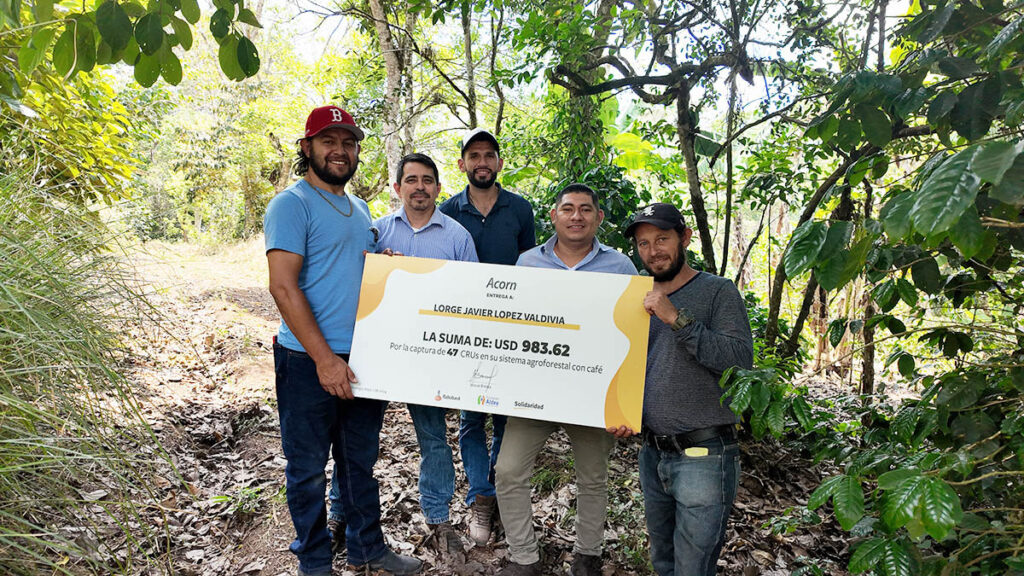
“This project has been very welcomed by farmers since it changed the mind of those who were in doubt or disbelief (regarding carbon markets),” says Lorge Javier Lopez Valdivia, a coffee producer.
“Once people received their payments, motivation grew. And the motivation is not only economic, people feel motivated to keep protecting trees and establishing new agroforestry systems to grow coffee.”
As of May 2024, 9,020 producers in Nicaragua with an average of 1.6 hectares have already implemented agroforestry systems on their farms and have joined the Acorn platform. Solidaridad is supporting these farmers to incorporate high-value forest species and expand agroforestry systems further.
In the first 18 months of the project, a total of 36,433 metric tonnes of CO2 equivalent have been removed by 2,698 coffee farmers and sold through the Acorn platform to five buyers. The producers received 758,560 USD, equivalent to 80% of the total sale of the carbon removal units (CRU). Solidaridad’s support has been crucial to the programme’s success, and now cocoa producers are joining the platform, and will be eligible to receive payments next year.
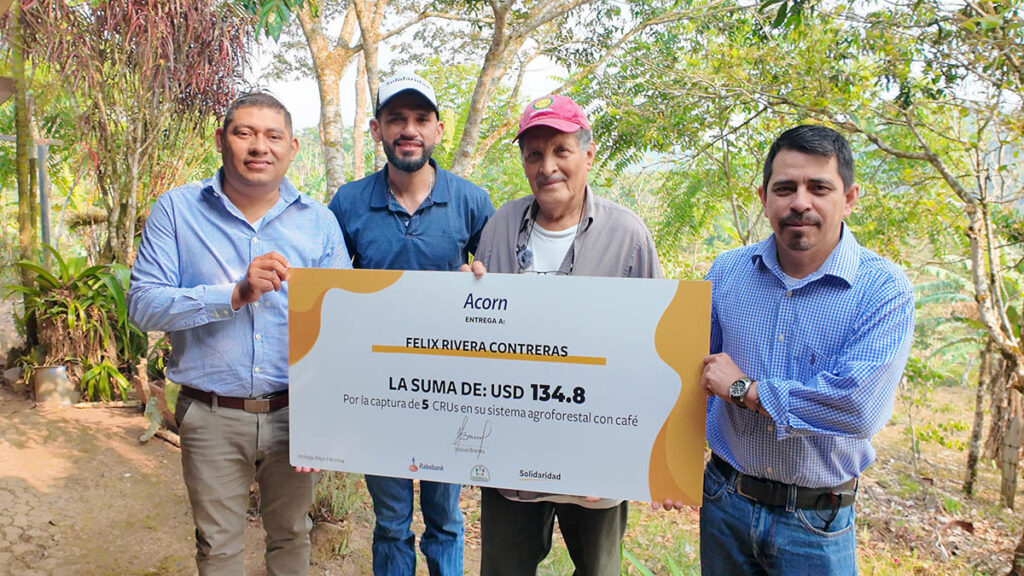
These incentives provide the financial muscle producers need to face coffee cultivation needs. If someone comes, I would tell them it is convenient, introduce the programme to them and help them join.
Felix Rivera Contreras, coffee producer in Nicaragua and Asómbrate participant
Moreover, Solidaridad has trained 237 technicians in climate-smart practices and management of agroforestry systems, while providing them with general information on voluntary carbon markets. These trainers have shared this knowledge to 2,494 producers in the project’s intervention areas, with the goal of reaching 25,000 producers in the coming years.
Additionally, there is an ongoing process to validate digital tools that contribute to improving both technical assistance and communication, and strengthening local capacity. These tools include the Carbon Academy learning platform, using WhatsApp in combination with field training for educational purposes, and the Farm Diary mobile tool, which is used by the producers themselves.
Agroforestry systems that benefit small-scale farmers
By adopting agroforestry systems, small-scale coffee and cocoa growers obtain several benefits, such as:
- Improved crop productivity and sustainability
- Improved soil health
- Access to additional income through carbon captures
- Protection of cropland from climate change
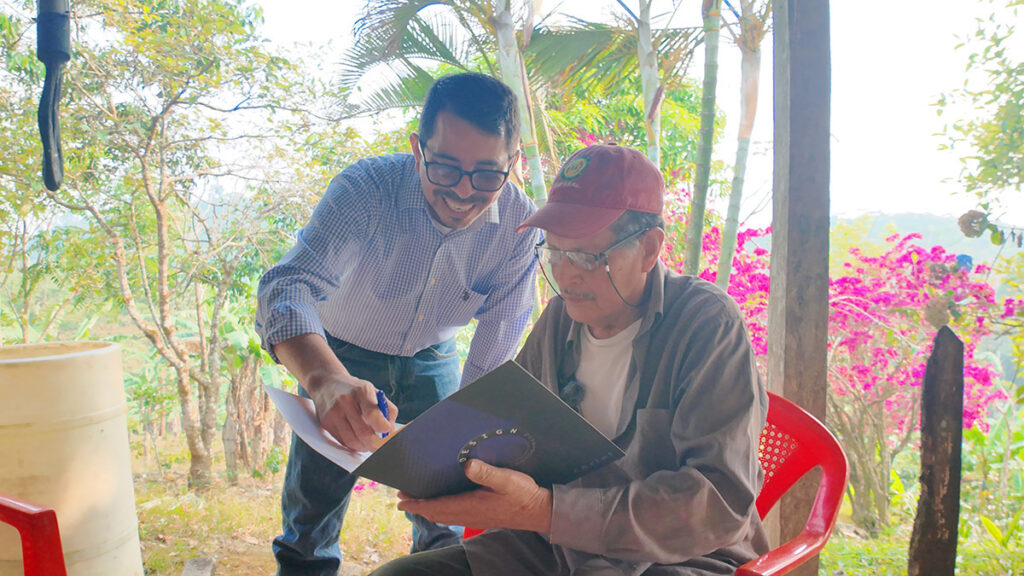
“Ten or twelve years ago a consultant from India came and told us: ‘plant trees, conserve these mountains, because in the future you will be paid for this production of oxygen,’ but we regarded that as little more than a dream. When this project began we listened, yes, but not with great enthusiasm, because everything can change,” said Maura Jarquín Blandón, a coffee producer.
“But the project has delivered a boost of resources at a critical moment right after we have harvested and delivered our coffee, but before the price final, when we still don’t know whether we lost or won. Now with this incentive, we can carry out work that is specifically needed at this time.”
How Asómbrate & Acorn work together
Rabobank’s Acorn platform facilitates small-scale farmers’ access to carbon markets. As farmers plant and maintain trees to improve their agroforestry systems on farms, they can sell the carbon captured by their trees to the market. Each year the programme assesses if the planted trees have grown, and based on their growth, carbon credits (CRU) are generated and sold. Sales can be extended for up to 15 years.
Step-by-step
- Solidaridad, via Asómbrate, provides farmers with training and technical support to adopt new agroforestry systems or improve existing systems.
- Solidaridad georeferences coffee or cocoa cropland to evaluate the potential for carbon sequestration.
- Acorn uses satellite technology to monitor tree growth on an annual basis.
- As trees grow their biomass captures CO2 from the atmosphere.
- One metric tonne of CO2 equals a Carbon Removal Unit (CRU). Each CRU is assigned its own verification number and is recorded in Acorn’s carbon registry.
- CRU buyers then use the Acorn platform to pay for the carbon removals from coffee and cocoa agroforestry systems.
- Smallholder farmers receive 80% of the total carbon credit value (less local applicable taxes) for their efforts in mitigating climate change.

